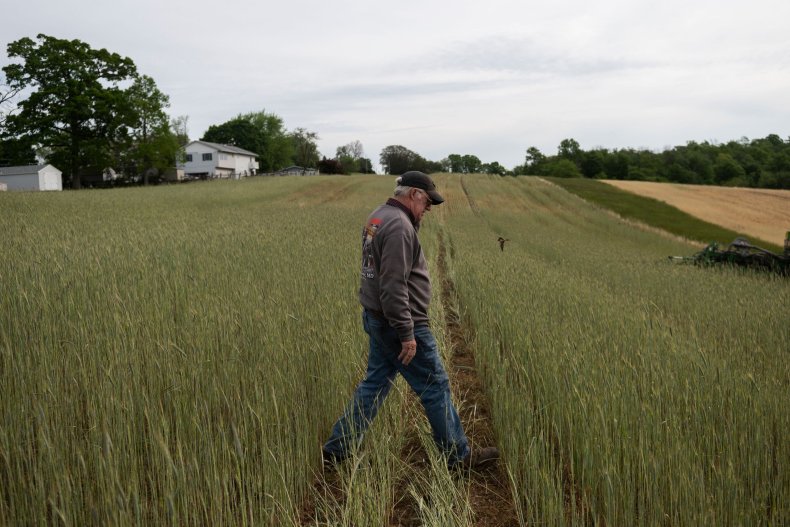Last month, the U.S. Department of Agriculture marked another disappointing development in the Biden administration’s lackluster trade agenda. It projected that our agriculture trade deficit—which already shattered records this past fiscal year—will climb to $27.5 billion for Fiscal Year 2024. This alarming trajectory requires immediate solutions, but unfortunately, as is standard operating procedure for President Joe Biden and his entourage of advisors, the priorities of rural America are regularly pushed aside and forgotten. Those who will suffer the most from this inaction are the hardworking men and women who feed and fuel our country and the world. We need a course correction.
Facing elevated input costs and economic uncertainty, American farmers and producers deserve access to new export markets and higher prices for their products to succeed and grow. However, it is evident—from its poor policy decisions and clear disorganization—that the Biden administration is more concerned with imposing mandates on our families and burdensome regulations, like the EPA’s Waters of the United States rules, on our farmers than exploring new trade opportunities that will benefit our economy and agriculture community.
Just like he’s done with energy policy and foreign affairs, President Biden has forfeited the initiative on free-trade agreements to our competitors, who are actively expanding their economic relationships. American producers need lower tariffs and new markets to sell their goods, but the Biden administration is instead wasting time on eliminating non-tariff barriers, which are unenforceable and therefore essentially meaningless.
The United Kingdom, Taiwan, the European Union, and half of Asia are all eager to start discussing substantive free-trade agreements, yet the Biden administration is only interested in pointless “dialogues” and “frameworks.” Many of these engagements are small, reactionary measures to ease the global uproar caused by the protectionist provisions in the Democrats‘ nearly $1 trillion Inflation Reduction Act, which fueled the inflation crisis the administration swore it would resolve.
The reality is that the global competitiveness of American agriculture depends largely on new export markets. For example, countries with which we have negotiated trade agreements import far more American-grown corn than those which we have neglected. Negotiating new trade agreements means fewer tariffs and fewer regulatory barriers for agricultural exports, opening new markets and making our farmers more competitive. We are missing an opportunity for our corn and soybean growers and our entire agriculture community to benefit from diversified trading partners. As our global competitors pursue new agreements, American farmers are getting left behind and our goods are being artificially restricted from markets that we can—and must—develop.
Nowhere are President Biden’s failures on trade policy more evident than Mexico’s biotech corn ban and Brazil’s skyrocketing tariffs on American ethanol.

In 2020, Mexican President Andrés Manuel López Obrador proposed—in violation of the United States-Mexico-Canada Agreement (USMCA)—a total ban on biotech corn by 2025, leveling unfounded accusations about the safety of genetically modified food. Mexico doubled down on this decree in February, and the Biden administration dragged its feet, never fully utilizing the dispute settlement tools available through the USMCA to address the issue. It wasn’t until August 17 that it formally requested a dispute settlement, six months after the latest decree. This issue remains extremely problematic for American corn growers—a quarter of whose exports go to Mexico every year. Some reports estimate that this move would eliminate roughly 30,000 American jobs and drain $30 billion from our economy.
In the same vein, Brazil implemented a 16 percent tariff—which will jump to 18 percent next year—on American ethanol exports. This reckless decision will seriously disadvantage our farmers, ethanol producers, and rural communities across Iowa, Illinois, and throughout the Midwest. Even more absurd is that Brazilian ethanol producers have access to our Renewable Fuel Standard, yet our producers are prohibited from accessing Brazil’s biofuels initiatives, an inherently unfair and uneven ordeal. That’s why we joined forces in a letter to U.S. Trade Representative Katherine Tai, urging her to leverage her power to end these ridiculous tariffs and hold Brazil accountable for its unfair and costly treatment of American corn growers and ethanol producers.
The House Ways and Means Committee—on which we serve—is responsible for trade policy and oversight of the U.S. trade representative. President Biden himself has yet to mention the issue of biotech corn with Mexico, and USTR’s responses to the Committee on tariff reductions and new trade agreements have been wholly insufficient. American farmers and producers deserve a strong voice and a seat at the table when it comes to enforcing existing trade agreements, holding foreign countries accountable for destructive trade barriers, and developing new market opportunities.
It’s time for the Biden administration to wake up. The 20th century afforded our great nation unprecedented economic preeminence, but that advantage has long been deteriorating in the face of rising competition. China has negotiated 10 free trade agreements over the past decade. In an increasingly competitive global economy, we can’t afford inaction.
As members of the House Ways and Means Committee, we will continue our work to secure new economic opportunities for our farmers, establish new trade agreements with underleveraged nations, and demand better from President Biden and his administration for the sake of American agriculture and our farm families.
Source : News Week

